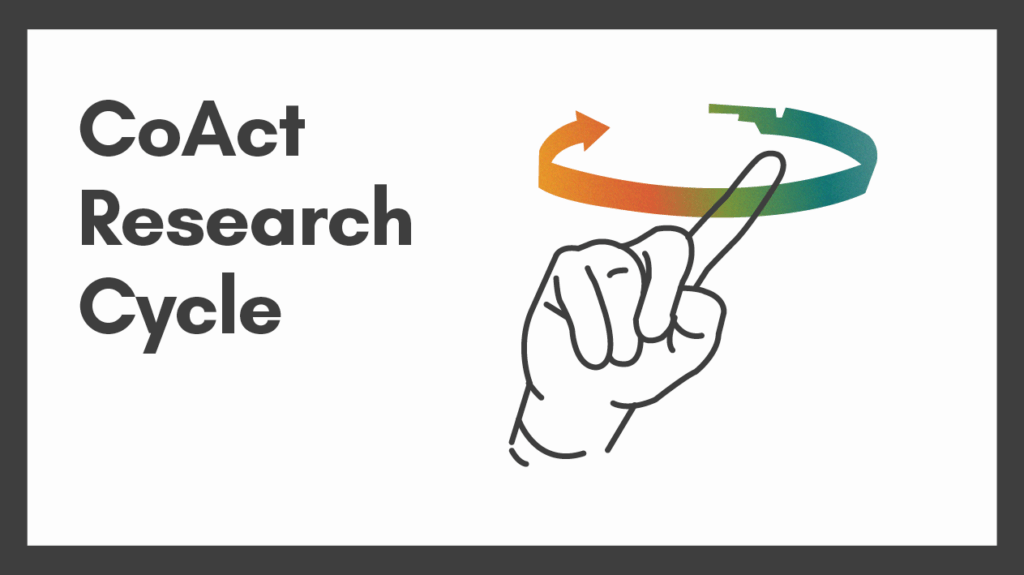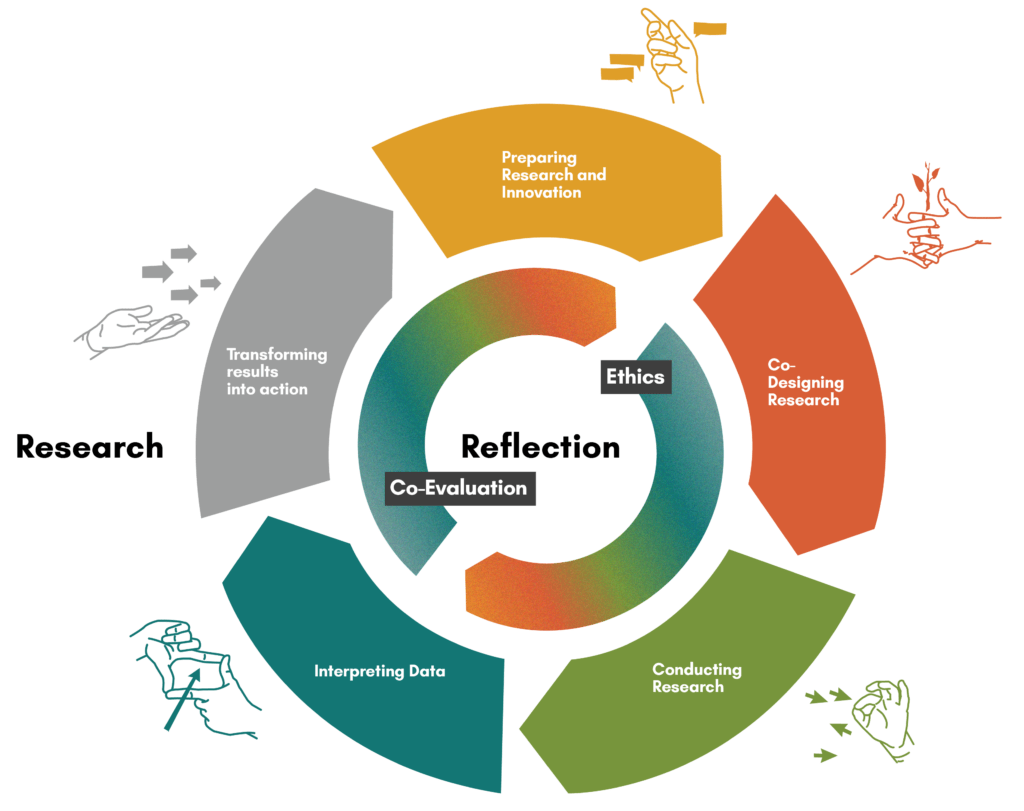

CoAct promotes and further develops methods and tools for citizen social science. Tools were developed, tested and applied in four research fields: mental healthcare, youth employment, environmental justice and gender equality. The Research Cycle presents the different steps and principles that guide the research process. These tools proved as helpful and valuable for the knowledge production and development of innovations in citizen social science projects.
The research cycle comprises five research steps: 1. Preparing research and innovation, 2. Co-designing research, 3. Conducting research, 4. Interpreting data, and 5. Transforming results into action.
The research cycle is further guided by two “transversal” concepts: Ethics and Co-evaluation. Transversal concepts are guiding principles for each step and the overall research and innovation process. In CoAct, ethics and co-evaluation provide conceptual and operational direction for each research step and the overall research cycle. In this part of the toolkit, we explain the CoAct research cycle steps and transversal concepts and present practical information on how to integrate them in citizen social science projects.
Having a well-defined research topic and question is a crucial first step for every scientific project that aims to achieve positive social, ecological, and political impact in the day-to-day lives of individual and community stakeholders. In citizen social science, this means explicitly identifying a research problem that takes into account, builds on, and aims to improve stakeholder experiences. This initial research phase involves examining and learning about the research context, refining the research problem, and identifying precise research questions. It also involves building a productive network of interested and competent stakeholders willing to participate as co-researchers in the project. An essential dimension in this step is to develop close ties among all participants and organise diverse engagement forms. The research and innovation activities should be based on all co-researchers’ needs, expectations, and capacities. Building a network of co-researchers should conform to establishing a “knowledge coalition”. A knowledge coalition is a wider network of people and institutions – decision-makers, administration, professionals, civil society organisations etc. – that play a crucial role in the field and can act as an advisory board and alleys for deliberation, dissemination and action planning and implementation. The first step, Preparing research and innovation should sufficiently answer the following guiding questions: Who are the different stakeholders? What are the social concerns present in the field? How can participating co-researchers be engaged and included in the research process? By the end of activities in this step, an agreement on precise research questions and goals for action should be reached.
Co-designing research is an invitation to all co-researchers – academic and citizen – to take part in the realization of a research project. After the research problem and question(s) are defined following decisions must be deliberatively made:
Which methods are appropriate to collect and analyse data?
How is the field access to organize?
Which sampling strategies should be applied?
What kind of dissemination and action strategies should be developed?
CoAct stresses the importance for citizen social science to address complex societal challenges through participatory and creative methods. The aim in this step is to clarify and create a shared understanding of how the general research problem can be broken down into innovative methods and actions to address the issue at hand. The second step Co-designing research responds to the following key questions: Were qualitative, quantitative or mixed methods used? Which methods for data collection are applied? How do different groups engage in the research and co-design? What unique strategies would foster stakeholder engagement? How do these forms of engagement shaped and reshaped the design of research, or, how is co-design organized through the research process?
Conducting research focuses on data collection with the methods chosen based on the previous phases of research preparation and co-design. In this step, the research has a well-identified structure with the procedures, roles, and responsibilities co-designed, negotiated, and communicated among academic and citizen researchers. Here, it is important to break down the general research topic and questions into sub-questions that are applicable and contextual. Additional training on research methods should be planned for the community experts to ensure “healthy” data, that is complete, accurate, ethical, and scientifically rigorous. In a citizen social science project, conducting resarch is also the step when scientific partners monitor the progress of activities to achieve action-related project goals (and to ensure that scientific standards for rigour are met). Conducting research is a collaborative process of (re)negotiating the further course of research, resolving pitfalls and disputes. A continued conversation on participation, ethics and co-evaluation among community and scientific research partners is key to align the research process to the different perspectives and interests of all involved stakeholders. Step 3 Conducting research should address the following questions: Are chosen methods of inquiry adequate to answer the research question? Are the reserach instruments developed according scientifc standards? Is data gathering complete? Are there any new, emergent needs for additional data? Do the ethical procedures and strategies of the project represent the needs and requirements of data collection?
Citizen social science mobilizes and engages volunteer participants for the analysis and interpretation of data. Co-researchers, stakeholders and community partners may participate in multiple stages of the research cycle. An important role for professional researchers when it comes to data interpretation is to actively facilitate low-threshold procedures to explore and make sense of data with volunteer co-researchers. It is important that the complexity especially of data analysis is broken down to make participation feasible even without formal education in scientific method. Step 4Interpreting data provides answers to questions such as: What are feasible and meaningful methods for analysing date? What are the different meanings and possibilities around existing data? Are these meanings adequately examined, made sense of and collaboratively discussed in the context of the wider research questions?
Transforming results into action is on processing and presenting information to inform the public, to change established policies and practices, and to mobilize collective action. Like any other research approach, citizen social science should be critically considered and evaluated for both its scope and limitations. However, citizen social science has the potential to make a significant impact both on the social world and on the democratisation of science. Public engagement is an intrinsic, core dimension of this process. Project results can be turned into action and achieve social impact pursued by citizens and civil society organizations . As such, the fifth step completes the research cycle by re-connecting results to the first step of research identification for another round aiming at a progressive spiral of research planning, doing research, changing the social world. Because the entire research process was co-designed and implemented collaboratively with the stakeholders, the results have immediate relevance for social practices and change as a built-in function of the project from its inception. Step 5 Transforming results into actionprovides answers to: What are the immediate and long-term implications of the analysis? How do findings relate to stakeholders’ needs and expectations ? How can results inform social actions and change?
Co-evaluation invites co-researchers to collaboratively (in Steps 1 through 5). Co-evaluation assesses and guides the development of the research questions, goals, and objectives as well as research methods. Co-evaluation means that stakeholder and scientific researchers discuss, deliberate, and document the ground rules and definitions of success, the expected challenges, and the unintended effects at the beginning of a project. These rules and definitions are regularly re-visited during the later steps of the research cycle. Co-evaluation may even extend beyond the project’s timeline for long-term assessment of the impact of a citizen social science project. In CoAct, co-evaluation informs and affects the individual steps of the research cycle through responsible planning, shared ownership, inclusiveness and responsiveness, flexibility, and transparency. Overall, these co-evaluation principles maintain a focus on defining, evaluating and monitoring what changes and effective outcomes mean and how they can be achieved in a citizen social science process. here without questions?
The CoAct research cycle is guided by the ethical values and principles of inclusiveness, horizontality, equity, trust and respect, open science, co-ownership, empowerment, and reflexivity. Inclusivity means prioritising the participation of vulnerable and under-represented communities and individuals in a research process. Horizontality means monitoring, and where necessary, shifting power relations and re-allocating responsibilities among co-researchers. Equity is a value that calls for careful planning to achieve equitable distribution of resources among research partners. Trust and respect are fundamental values that are strongly promoted along the overall process. All participants must freely express themselves in an informal and non-judgemental atmosphere. Knowledge production in the project means practising open science. This is to say, all materials, datasets and results are made openly accessible under Creative Commons Licenses. Co-ownership applies to all outputs of the project. Co-researchers are considered co-owners of collectively generated materials and results. They are also invited to contribute as co-authors of (scientific) publications. Empowerment is a crucial goal throughout the whole research cycle. All of these ethical principles and values require continued reflexivity in order to evaluate, modify, and improve professional researcher actions and attitudes towards internal hierarchies

